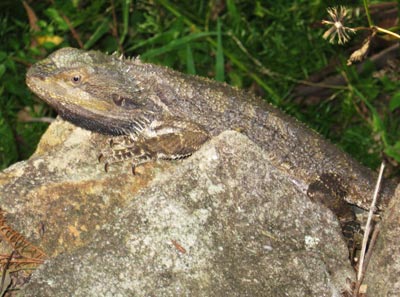LIKE MAWSON IN A BLIZZARD
The following thoughts arose from a casual observation. I have rather poor eye sight, especially in the morning’s glare. Things are, to say the least, very blurry. One morning last year, something white caught my attention on the grassed side walk, across the road from my home. I could not decide what it was. From the many possibilities that came to mind, I pondered which the correct one was.

I started to reflect on the analogy with this white “something” and life in general. Throughout our lives we are determining truths. Sometimes we are told to agree and not question opinions presented by others. I have found that you cannot really argue with a person who claims to know the truth.
When assessing truth, age and experience may be cited to influence our decision. We can be persuaded by an expert or someone of whom we think favourably and trust. Sometimes majority pressure can be the deciding factor. Not many like to go against the flow and it can appear easier to agree without a fuss. At other times we are given misinformation or told part of the truth in order to influence our decisions. This does not always have to be intentional. Fact can get confused with opinion, emotion can muddy reason.
Certain “truths” indelibly and unconsciously seep into our consciousness through family upbringing and early education. Unquestioning acceptance of certain beliefs, whether right or wrong, at an early age can stay with us for a life time. Where these beliefs are synonymous with prejudices, we have a real problem. I only have to think back to the amount of religious prejudice that was around during my childhood in the 1950s.
Sometimes the language used to express a statement of fact can be deliberately misleading. When political and military leaders talk about warfare, for example, they often resort to euphemistic language to side step or guild the truth. They talk of missions, containment of the enemy, controlling the situation, collateral damage, precision bombing, military surges, taking out the enemy, presumably as you would the garbage, and so on. They may as well be speaking gobble-de-gook. Euphemisms like these deliberately disguise the truth.
Recently I was working in my backyard. It was hot and humid. Suddenly I was aware of movement and was surprised to see what I believed to be a lizard, a bearded dragon, sitting motionless on a rock embankment about a metre away from me. After quietly observing him for a minute or so, I dashed up to the house to grab my camera. When I returned I could not see the lizard, although I thought a rock looked somewhat out of alignment and could possibly have been the lizard’s head. I got closer but still could not be certain. In frustration, I took a photograph anyway. I was most surprised and pleased to find later that I had actually taken a decent photograph of the lizard.

The incident with the lizard reminded me again of my failure to identify the white object on the grass the previous year. On further thinking about these two unrelated events, I again started to reflect on life, its truths, uncertainties and contradictions. Our ability to see truth is sometimes limited. For all sorts of reasons, we seem blinded to it.
Often we hear someone say, “Don’t take my word for it” and then thrown down the challenge to “find out for yourself”. Attempting to find the truth can sometimes be fraught with difficulty and can sometimes lead the searcher further away from any certainty. Sometimes the truth will seem eternally illusive and may require a leap of faith.
I am reminded of the biblical story when Mary Magdalene anointed Jesus’ head with a precious ointment at Bethany. This happened shortly before His crucifixion. Some who witnessed Mary’s action became angry, suggesting that rather than waste the ointment, she should have sold it and given the money to the poor. Jesus rebuked them, describing Mary’s action as “a beautiful thing”. Her gesture showed that she saw beyond the sight of those around her. I believe there are times in our lives when we have revealed to us the certainty of belief that we sometimes feel is beyond us. The veracity of those beliefs can be held up to possible rigorous scrutiny, especially in regard to their depth and strength of sincerity.
When I came to the realization that I had a conscientious objection to war, back in the 1960s, I had little confidence that I could convince another, especially a stranger, that there was validity to my conviction. Being called up for National Service meant that if I was going to be true to my conscience, rigorous scrutiny of my personal beliefs was inevitable.
My declining vision can at times be very frustrating and frightening. I have lived with Fuchs Dystrophy for a number of years and, with the help of my family and friends, accommodate my lifestyle around it. It is a degenerative corneal disease that affects both my eyes. It is sometimes hard to describe to others the limitations it imposes on my sight. Recently I compared it to feeling like Douglas Mawson in an Antarctic blizzard.
I am continually grateful for the sight I still possess, regardless of its limitations. Without meaning to sound in any way self-righteous, I am thankful too for those rare times in my life when I have had revealed to me the certainty of belief that I felt was beyond me.
And no eye disease will ever threaten that.
© Jim Low
[June 2008 (adapted for web 24 September 2008)]
You can read the lyric for Like Mawson in a Blizzard here.
Song, Like Mawson in a Blizzard, available on CD - see details
